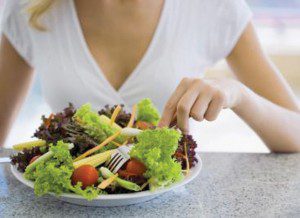

But unlike the heart, liver, and kidneys, the gall bladder isn’t necessary to keep the body healthy and functioning but not having your gall bladder can cause digestive issues for the rest of your life. Even when it isn’t working as well as it should and gallstones develop, most people are unaware that there is a problem.
Ever have a sharp pain in your stomach out of the blue and wonder why? It could be gall stones. You can’t see or feel your gallbladder, but you sure can tell when you’re having problems with it. A gallbladder attack can make life miserable, causing sudden pain in your upper-right abdomen.
A small percentage of people who suffer with gall stones have a variety of symptoms, such as abdominal pain, bloating, nausea, and vomiting. When gall stone symptoms are frequent, recurrent, and especially uncomfortable, the typical treatment is surgery to remove the gall bladder.
Although diet doesn’t directly cause gallbladder problems and it won’t cure them watching what you eat and keeping a healthy weight might help you prevent gall stones from forming and avoid some discomfort if you do develop gall stones. Creating a diet that promotes gallbladder health is essential for those who are at risk for developing gallbladder disease. Much of the gallbladder diet revolves around avoiding food that is prepared in an unhealthy way. Highly processed foods such as prepackaged meals, cookies, pies or other desserts have a high fat and sugar content that can be unhealthy for gallbladder patients. These foods also have a high sodium content that can cause digestive distress. Foods which have been fried should be avoided
Prevention is better than a cure. An ounce of prevention is worth a pound of cure. It may be a good idea to reduce your fat intake as a preventive measure. Don’t get tricked into thinking that you have to eat a complex or mysterious diet to prevent gallbladder problems. No foods have been clearly demonstrated to be independent risk factors for gallbladder disease.
A number of risk factors contribute to the formation of gall stones, including a family history of gallstones. Body weight is also a factor the risk of gall stones is higher in people who are overweight and obese. Diets that are high in fat and cholesterol and low in fiber appear to play a role.
Like most other parts of your body, your gallbladder needs a healthy diet to work at optimum potential. Diet affects the gallbladder because diet affects your weight. If you eat a healthy diet and have a healthy weight, you are more likely to have a healthy gallbladder. Too much cholesterol and fat and too little fiber in your diet can cause obesity as well as gallbladder problems.
Your best weapon against gallbladder problems and gall stones is to keep your weight in check by eating a well-balanced diet. Gallbladder disease and gallstones are almost always the result of poor nutrition. For example: consuming a lot of soft drinks, sugar products, highly acidic foods like red meat and products made with white flour all contribute to the formation of gallstones.
Whether or not you are at risk for gallstones, it’s always a good idea to keep your body at a healthy weight and eat a diet that is low in fat and cholesterol, moderate in calories, and high in fiber. Diet primarily contributes to gall bladder disease by contributing to obesity,All of the following are healthy foods for your gallbladder, as well as the rest of your body:
• Fresh fruits and vegetables
• Whole grains
• Lean meat, poultry, and fish
• Low-fat dairy products
An active lifestyle will also help to reduce gallbladder problems. Gallbladder removal surgery is common. The most common reasons for gallbladder removal are gall stones, infection and gallbladder disease which lead to inflammation and pain.
In most cases, the surgery is scheduled in advance, but in cases of severe inflammation, a gallbladder surgery may be performed urgently after diagnosis. Testing for gallbladder disease includes a physical exam, blood tests, and possible abdominal imaging that can detect the presence of gallstones and blockages.
Lehigh Acres Surgery can answer all your questions you may have in regards to whether gallbladder surgery will be needed or not. A healthy diet will help keep your gallbladder happy and free of disease.
Lehigh Regional Medical care
239-368-0241
 Southwest Florida's Health and Wellness Magazine Health and Wellness Articles
Southwest Florida's Health and Wellness Magazine Health and Wellness Articles

